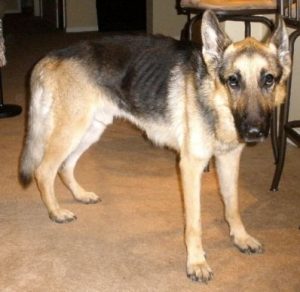What is the E.P.I.

EPI Dogs Disease is the pancreas no longer secretes or has too few digestive enzymes. EPI (Exocrine Pancreatic Insufficiency) is a disease known to the German Shepherd and other races but unfortunately not known to all our veterinarians.
What is the EPI Dogs Disease?
The pancreas has 2 functions, the endocrine part for the hypoglycemic hormones (Insulin) and hyperglycemic hormone (Glucagon). The exocrine part is used for enzymatic secretion for the digestion of food by secreting among other things amylases, proteases, and lipases. When the Exocrine part no longer works or malfunctions (AAP), everything the animal eats simply goes straight. So, no assimilation of nutrients. This is what causes continuous diarrhea and considerable weight loss in the dog.
What are the symptoms of EPI:
Diarrhea, yellowish stools, gurgling stomach, large weight loss, voracious appetite or more than normal and very fatty stools. As the dog can no longer digest fats, fats are easily visible in their stools.
L’ E.P.I is a serious but easily controllable disease. Talk to your veterinarian about this site. Many veterinarians do not know this disease well because it is a significantly rare disease and as your veterinary clinic or hospital is local, it is possible that there has not been a case in their establishment.
Solution:
So if your dog has such high symptoms, I recommend that you pass a TLI (Trypsin-Like Immunoreactivity) test on your dog. The price may vary from veterinarian to other, around $ 225 for the TLI / Cobalamin and Folic Acid test. It would be in your pet’s best interest to do so.

B12 treatment
There are 2 types of treatment possible to make up for your pet’s Cobalamin (B12) deficiency. Either by your veterinarian by injection or by B12 capsule. Be careful not just any B12 capsule. B12 must contain intrinsic so that the dog can better assimilate Vitamin.
When your dog will be diagnosed with IPE, there are different treatment options available to you. In fact, the treatment remains the same as that your veterinarian would give you but at much lower cost.
The treatment:
The newly diagnosed EPI dog who has had diarrhea for some time is most likely to need an antibiotic. As the dog does not digest fat well, an accumulation of fat remains in its large intestine, and it is an ideal environment for bacterial proliferation. Which can cause chronic diarrhea. To treat this bacterial overgrowth, treatment with Metronidazole or Tylosin is strongly recommended. This antibiotic is used to kill the bacteria present in its large intestine, helps in the solidification of the stools. A probiotic (Fortiflora) could also help the animal to rebuild its intestinal flora.
About one teaspoon of pork enzyme per cup of food should be added to each meal. So, if you give 2 cups of food in the morning and 2 cups in the evening you will need to give 2 teaspoons morning and evening for each meal. The dosage can vary depending on the type and weight of your dog.
It does not matter the type of food whether it is raw or croquettes. It is necessary to wet their food and put the enzymes, mix well and then wait 20 minutes so that the enzymes can do their actions. For the raw, it is strongly advised not to keep the frozen Meat for the meal because the enzymes will not be able to make their actions with food to freeze. It is also important to give them a grain-free diet low in fat (Max 18%) and fiber (Max 4%). You can always refer to the Food page for more details.
For french information en EPI, Please go to : IPE-Québec
For Veterinary section: Here